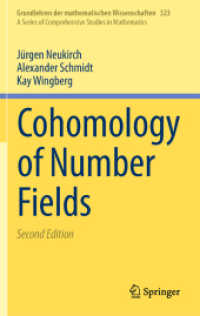- ホーム
- > 洋書
- > 英文書
- > Multicultural Non-Fiction
Full Description
At the end of the 1830s, during the reign of Tsar Nicholas I, two famous accounts, through foreign eyes, were being written about Russia. By far the better known one is the Marquis de Custine's Russia in 1839. For all its brilliance, however, it doesn't begin to compete with J. G. Kohl's slightly later work, just called Russia, when it comes to thoroughness, range and sympathy of observation.
Kohl was a German. Unlike de Custine, who only made a brief visit, he spent several years in Russia. He assimilated himself, learnt the language and enjoyed the experience. He set himself the task of writing about 'general features and popular manners of a large portion of the Russian Empire'. and succeeded with warm-heartedness and tolerance. It is refreshing to read such a positive account. For example, St Petersburg appeared to him not only a beautiful but a cheerful city with its dashing izvoztchiks, its crowded market-places, its frequent fetes, when high and low mixed together.
He was not afraid of paradox, of Russia itself writing, 'There is perhaps no country in the world where all classes are so intimately connected with each other as in this vast empire, or so little divided into castes. Contrary to the prevailing belief, in no country are the extremes of society brought into more frequent contact, and in few are the transitions from one class to another more frequent or sudden. The peasant becomes a priest on the same day perhaps than an imperial mandate degrades the noble to a peasant or to a Siberian colonist. Hereditary rank is disregarded while public services often lead rapidly to the highest dignities. Even serfs are more nomadic in their habits than our free German peasants.'
The English translation was first published in 1842.








